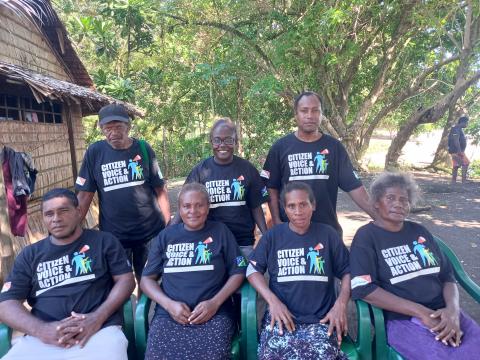Educating Solomon Islanders on National Health Standard Policy


A European Union funded project “the One Voice of World Vision Solomon Islands continues educating communities in Makira and South Malaita about the National Health standards.
This is part of the collaboration to support the role out of the National Role Delineation Policy by the Ministry of Health and Medical Services.
The fundamentals to the policy defines the different levels of service in the Solomon Islands Health System, developed based on the principles of Primary Health Care, acts as a catalyst for health sector reform to strengthen quality service delivery, lays the service delivery foundations for future development of the Solomon Islands Health System, provides guidance on types of services (service delivery packages) to be provided at each of the six (6) levels of service to inform service planning and improve service quality and defines the referral pathway.
This project is working to achieve the key outcomes which including CSOs are more knowledgeable, empowered and have the capacity to effectively guide and support community efforts in monitoring the delivery of health services against government commitments and standards, communities are more empowered to have the capacity to demand improved health services and the appropriate use of public funds and to enhance collaboration between CSOs, communities, MHMS and other agencies to strengthen governance and accountability of health services.
Recently, an awareness was conducted to the catchment areas of fifteen clinics in Makira and South Malaita on health policy and service monitoring. This it equips the residents of these areas on how to identify whether their clinics are meeting the standard that required under the policy.
The knowledge also enable Aringana catchment communities to speak out that their clinic is lacking certain criteria that stipulated under that policy.
The recent awareness was led by Mothers Union where the CVA teams engaged with communities on public policy awareness, specifically sharing information about the health standards that rural communities should expect at their health clinics. With this knowledge, community citizens will be able to provide qualitative evidence-based data on health service delivery needed to engage in a productive dialogue with the government on gaps or issues in relation to health service delivery.
It was through this awareness that the communities in the catchment area conducted a monitoring to Aringana clinic.
Ida Mae from the catchment area who was part of the Mothers Union team shared that during their awareness they found very interesting findings at Aringana clinic.
“Aringana clinic was built way back in 1966 and has continued to serve residing communities to date without any infrastructural renovation or repairs. The clinic is old and falling apart but still operational,”
“People continue to use the poor services without knowledge of a national standard public health service policy. However, thanks to the World Vision project as we now realize that our clinic never met the standards and this awareness really helps us to see and start to take ownership of the clinic,” she shared.
The monitoring did identify Aringana clinic is old, not accessing water supply, no toilets, very bad admission room, bad Antenatal room, bad sterilizing room, bad laundary and bad delivery room.
The monitoring also identified that the clinic is using water tanks, accessed to solar power and good sanitation to staff and meet the staff number that required by the health standards. The standards are important for citizens to know and the project is supporting the ministry going forward.
With the use of a visual information flipchart, the CVA teams were able to educate community citizens on the standard health service deliveries for rural clinics as stipulated in the Ministry of Health’s role delineation policy.
Approved by the national health promotion department of the Ministry of Health and Medical Service, the pilot version of the information flipchart contains basic animated illustrations that depict standard facility infrastructures, staff posting and medical supply that is being offered for rural health clinics.
Meanwhile, an active CVA Member from South Malaita Timothy said, the flipchart was very effective as community members easily understand the messages.
“The message on the flipchart are very easy for community members as they actively participated during the awareness by sharing their experiences and views,” Mr Timothy said.
He says although many were shocked, they also thanked World Vision for paving a channel that would bridge a stagnant gap between authorities and users of public rural health services.
A user monitoring scorecard survey also followed to determine the current quality of services received by community citizens including people with disability. The information gathered will be compiled for the project’s initial interface meeting between the community CVA teams and the public health service authority.
Meanwhile a media report last week stated that Aringana clinic will be demolished for free by a logging company operating at the area.